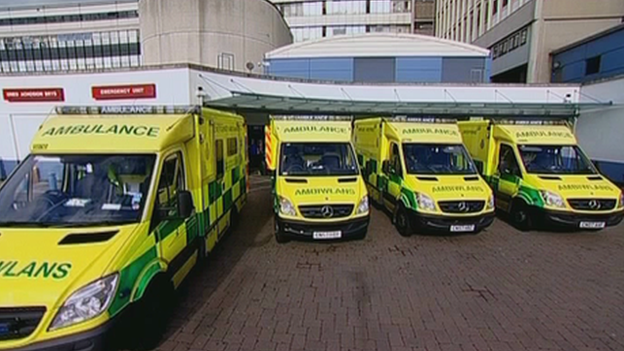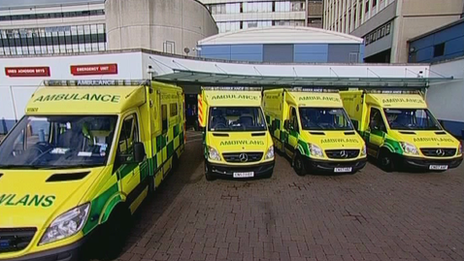Ambulance urgent response times slowest since 2011
- Published

Response times are markedly lower than the same month last year
The number of ambulances hitting the target response time for the most urgent calls has fallen to its lowest level for three years.
Only 51% of urgent emergency responses in November arrived at the scene within eight minutes, 14 percentage points lower than the target of 65%.
In October, 55.5% arrived within the target time. In November 2013, the figure was 63.2%.
The Welsh Ambulance Service said they were working on underlying issues.
The last time the service met the 65% target was in October 2013, but aside from this one month the target has been consistently missed since June 2012.
Figures released on Tuesday showed there were 36,091 calls in November, up by 5% compared to the same month last year, of which 14,061 were Category A or immediately life-threatening.
The ambulance service pointed to the rises in both the total number of calls and the number of those deemed serious and life-threatening.
'Concern'
Gordon Roberts, interim national head of operations said: "We absolutely recognise that our response times are not where anyone would like them to be.
"We are not complacent about this, and we are working extremely hard to address our underlying issues as a matter of urgency, working closely with our health board commissioners and the Welsh government."
He continued: "Regrettably, there are times when we don't meet the target and we appreciate how much of a concern this is for patients, their families, and the wider public in Wales."

Figures in detail
36,091 emergency calls in November, 1.8% down on October 2014, 5% up on November 2013
14,061 were Category A (immediately life-threatening) calls, 0.9% down on October, 5.9% up on November 2013
51% of responses to Category A calls arrived within eight minutes, down from 55.5% in October and 63.2% down from November 2013
56.4% of Category A calls responded to within nine minutes; 61% within 10 minutes, 77.8% within 15 minutes, 87.3% within 20 minutes and 95.5% within 30 minutes.
The average (mean) response time was 10 minutes and 43 seconds.

Mr Roberts urged the public not to use the 999 service for non-emergency calls to prevent tying up resources needed elsewhere.
A Welsh government spokesperson said these were very tough times for ambulance services across the UK and added: "The ambulance service must ensure it provides a swift response to life-threatening calls across Wales, while health boards must ensure patients are taken off ambulances quickly when they arrive at hospital so ambulances can be released to answer the next emergency call."
They said the government had given the service £7.5m to recruit more than 120 frontline staff, with 70 appointed since April and 12 more starting work in December, plus an extra £4m investment in new ambulances.
- Published25 June 2014

- Published17 December 2014
